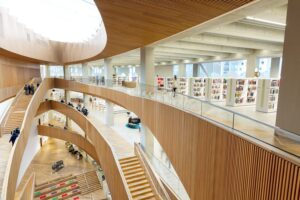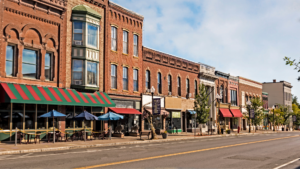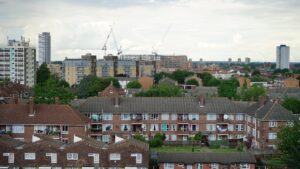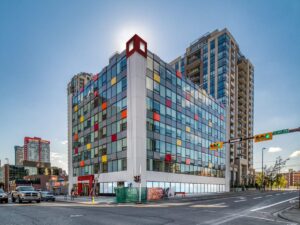CUI’s Applied Solutions Lab
CUI’s Applied Solutions Lab
CUI’s technical practice helps the public and private sectors build capacity for informed, creative decisions; shape public policy; and implement the best community practices.

Services
1. Research
We explore data and experience.
We carry out research to help communities identify needs and opportunities. We collect, analyze and visualize data from disparate sources to help understand the local context. To develop benchmarks, we analyze best practices and real-world lessons from community experiences. We are experts at organizing information to uncover and communicate patterns and relationships.
2. Solutions
We solve problems.
To develop practical solutions to issues confronting communities, we lead cross-disciplinary teams assembled from our staff and network of associates. By bringing diverse interests and expertise together, we seek to inspire holistic problem solving. We design our work to provide communities and stakeholders with a clear path forward.
3. Knowledge Sharing
We facilitate and educate.
Through community consultations, focus groups and interviews, we engage directly with stakeholders to resolve growth and development challenges. We create and manage partnerships to transform industry practices and hold events to share expert thinking and promote discussion on a variety of urban policy issues.
Areas of Expertise





Complete Communities
Promoting understanding of density and the attributes of complete communities.
Canada is increasingly becoming more urban. With more people in the same space means living at a greater density is inevitable. We identify and promote an understanding of density and the attributes of complete communities to help planners, designers, elected officials, and private sector builders design more complete communities and adapt existing communities over time, ensuring that not only housing but transportation, infrastructure, essential services and civic amenities are part of the mix.
Recent Projects
- Measuring Main Streets Platform
- Remaking Main Streets: Scaling Housing Options Through Intensification on Canada’s Main Streets
- Overdue: The Case for Canada’s Public Libraries
- A Jump Start: Providing Infrastructure for More Housing
- Visualizing Density
- Mid-rise Database
- Interviews to Support Implementation of the Growth Plan
- Downtown Community Services and Facilities Strategy
Downtowns & Main Streets
Making the case for investment in Canada’s neighbourhoods and downtowns.
Canada’s downtowns come in many shapes and sizes. They are economic centres, hubs of social and cultural activity and the source of pride and community. We use our skills in research, data measurement, visualization and engagement to support local governments and downtown stakeholders to make the case for increased investment in their downtowns and main streets.
Recent Projects
- Remaking Main Streets: Scaling Housing Options Through Intensification on Canada’s Main Streets
- A Living Capital: Investing in Downtown Ottawa for a Dynamic Future
- Measuring Main Streets Platform
- Supporting Communities During Major Transit Infrastructure Projects
- Downtown BIA 2.0 Study
- City of Toronto – Mount Dennis Planning Framework
- REEF Technologies
- City of Toronto – EDC Divisional Strategy & Economic Action Plan Consultation
- The Case for Conversions Guidebook
- Charting the Path to Office Conversions in Canadian Cities
- The Case for Conversions: Understanding Opportunities for conversions of office space to housing in Canadian downtowns
- The Case for the Core: Provocations for the Future of Canada’s Downtowns
- CUIxLocal: Victoria, Windsor, Halifax, Calgary, Edmonton
- Unboxing Uptown: The Transformation of a Main Street from the Inside Out
- Bring Back Main Street
- Quantifying the Value of Canadian Downtowns: A Research Toolkit
- Downtown Moncton Evaluation
- The Value of Investing in Canadian Downtowns
- Northern Ontario Downtowns Project
- I Belong Downtown
Community Resilience & Sustainability
Supporting the transition to resilient, low carbon communities.
Climate change presents opportunities to rethink the way we design, build and live in urban areas. Through our work, we help communities identify their biggest challenges to becoming more resilient and sustainable and develop the conversations, research, tools and strategies to make the changes needed to address them.
Recent Projects
- Both/And: Integration Natural Asset Management into Federal Housing Supply Policymaking
- Mobility as a Service (MaaS): A Feasibility Study on Implementing MaaS in the Greater Toronto Area
- Soils Bylaw Tool
- Improving Electricity Conservation in Small-Medium Municipal Water Distribution Systems Across Ontario
- Town of Halton Hills Climate Adaptation Plan
- Waterfront Toronto Resilience and Innovation Framework
- The Realized Results of LED Streetlights: Seizing the Opportunity
Housing Affordability
Using new forms of equity, policy and land-use to increase housing affordability.
The lack of suitable affordable housing in cities across Canada is a significant problem that all orders of government must work together to address in partnership with the private, non-profit, and co-operative housing sectors. Our work focuses on understanding the housing market challenges and exploring how a variety of tenure options and alternative equity models can support affordable housing, particularly for the missing middle.
Recent Projects
- Making the Case for the Middle: The Potential of Middle Housing Production in Alberta
- Remaking Main Streets: Scaling Housing Options Through Intensification on Canada’s Main Streets
- A Jump Start: Providing Infrastructure for More Housing
- What we Heard: Canadians Share Their Experiences with the National Housing Strategy
- A Municipal Comparison of Affordable Housing and Homelessness Delivery: Profiles of 11 Canadian Regions
- What is the Missing Middle
- Toronto Housing Market Analysis: From Insight to Action
- Scaling Up Affordable Ownership Housing in the GTA
- Regional Housing Data in the Greater Toronto and Hamilton Area
- Expanding Housing Options in Neighbourhoods
- National Housing Council – National Housing Engagement and Analysis
- Housing Accelerator Fund – BiCEP Engagement
Data & Technology
Applying technology to empower and connect communities.
With the steady expansion of the Internet of Things (IoT), there is significant opportunity for Canadian municipalities to empower their communities through information and communications technology (ICT) and connectivity. We work with cities to help them understand how they can employ data and connected technology to support smarter, healthier, and more equitable and sustainable communities.
Recent Projects
- Construction Mitigation – quarterly dashboards
- Mississauga Smart City Master Plan
- Durham Smart City Framework
- Smart Planning Our Future Cities
- Smart Planning Our Smart Cities

